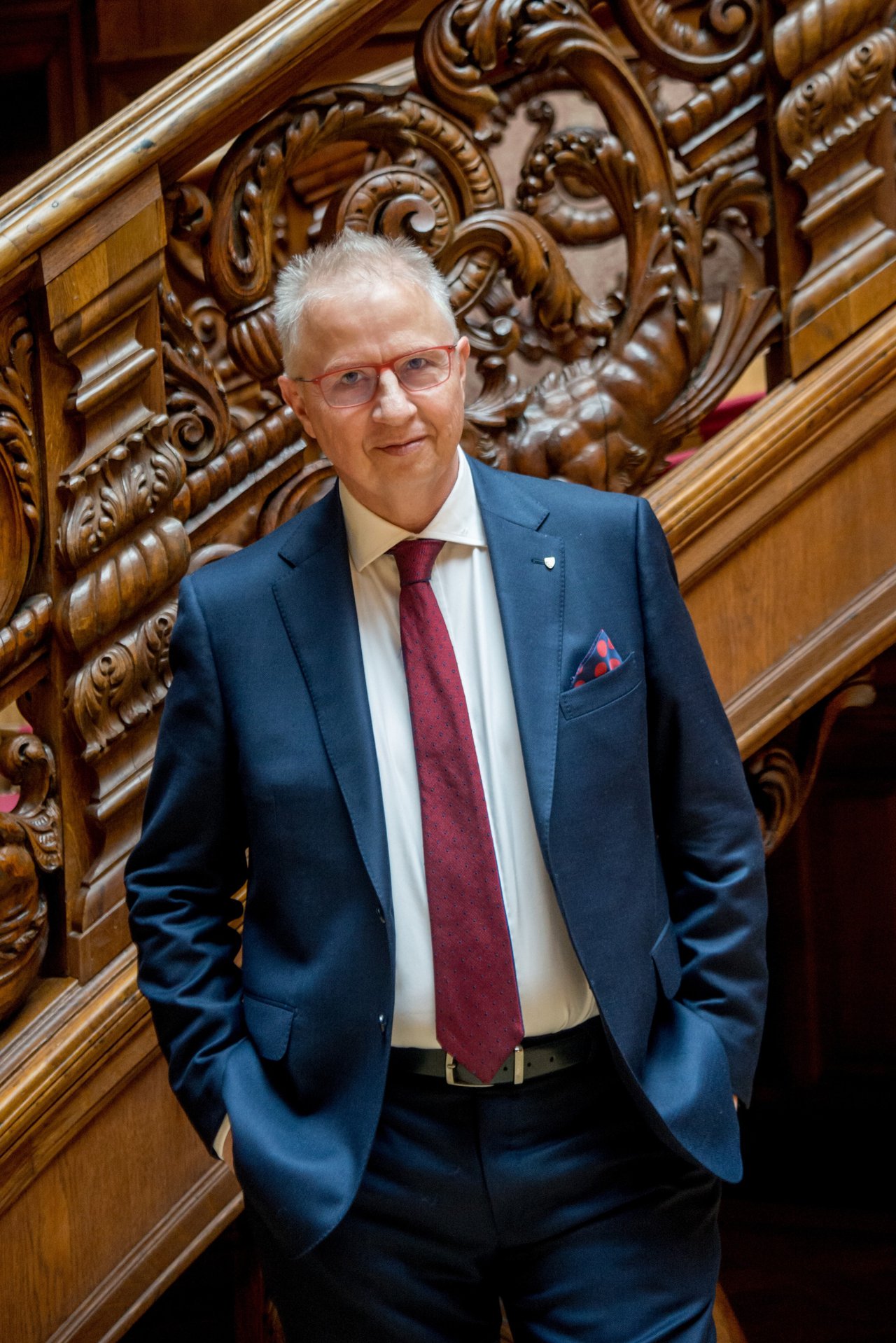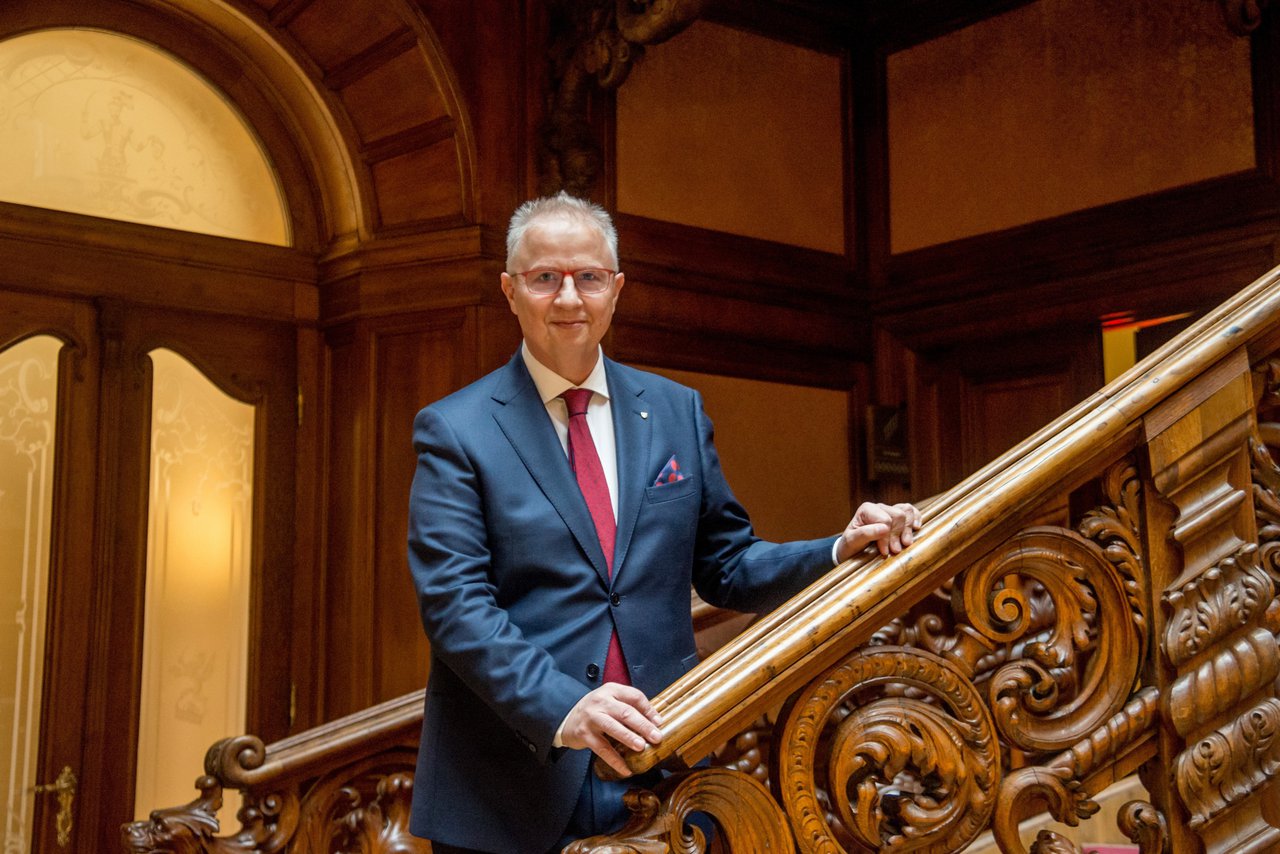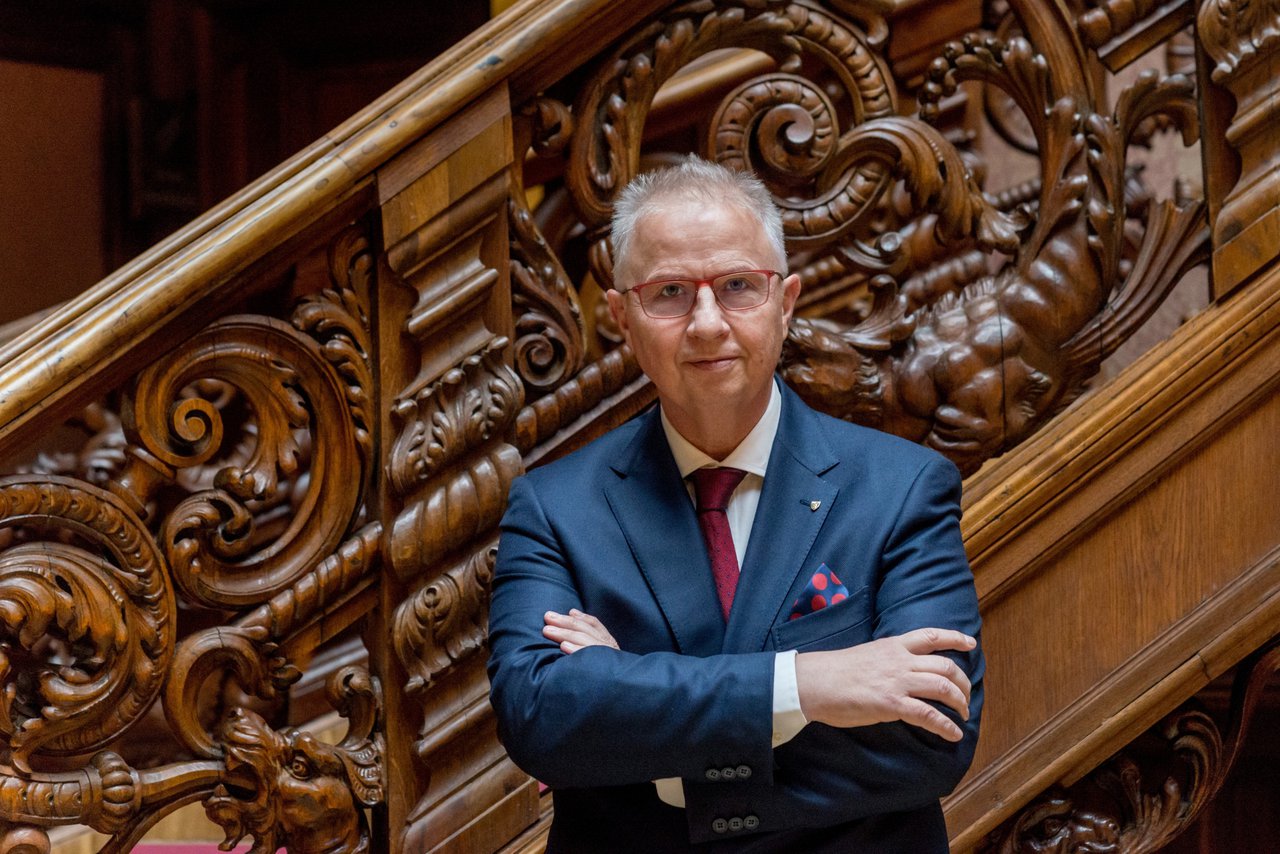László Trócsányi is a university lecturer of law and a public figure; he has been a member of the Constitutional Court of Hungary, Hungarian Ambassador to Belgium and France, Minister of Justice, a Member of the European Parliament, and since February this year, Rector of Károli Gáspár University of the Reformed Church in Hungary. Prof. Trócsányi, who is also one of the elders of the Reformed Congregation of Budahegyvidék, has a vision for a university that is appealing and outstanding, where talented young people come to broaden their horizons, who have the potential to form the Christian intelligentsia of future generations.
You have received quite a few offers, yet it was the leaders of the Reformed Church that you said yes to. Why is this so?
When I was first offered this honourable position by Bishop Zoltán Balog, I contemplated the offer for a while. On the one hand, I felt an obligation arising out of my family heritage. Some of my ancestors had taught at Reformed higher education institutions prior to WWII. József Trócsányi was a lecturer at the Reformed Law Academy of Sárospatak, while Dezső Trócsányi taught at the Theology of Pápa. Both of them authored a number of books. On the other hand, I had raised several generations of lawyers at the University of Szeged, and I felt that I had fulfilled my duties there. Providence had a new path for me. I needed some time to realise that, but now I clearly see the road that I have been meant to take.

László Trócsányi, Rector of Károli Gáspár University of the Reformed Church in Hungary
The road of public life or of being a professor of law?
The regime change of 1989 brought about an atmosphere of freedom. After the restraints of Communism I felt that something had to be done for safeguarding the future. It is, among others, thanks to János Martonyi and Zsolt Németh that I got the chance to enter public life in a variety of positions, but I never took off my “lawyer hat,” and I will keep it on in the future as well.
You have strong ties to Károli University: you were an active participant at its very birth.
The issue of Reformed higher education has always been close to my heart. During the years of Communism, churches were moved to the periphery with regard to education, and had to mostly operate under political control, therefore there was no room for Christian-based education that could distinguish between good and evil. It was the regime change that enabled the church to redefine itself. Károli University was founded in the early 1990s, under the auspices of Bishop Loránt Hegedűs. Many people contributed to his endeavour, but I must single out the role of Rector József Ujfalussy and Jenő Barátossy, both of whom worked tirelessly to champion the cause of the university. During this period, I had the opportunity to assist in the starting of lawyer training and subsequently in the launch of the Faculty of Law, but later my career took me in another direction.
In 1993, when the university was founded, the question was raised by many: Why does the church need a university? Now that we are well into the twenty-first century, what is your answer to that?
According to Christian faith, “in the beginning was the Word.” This is the source and ultimate standard of every reality, every discipline and rule, including the rule of law. The church, which has been entrusted with the Word, teaches the Word of God. Similarly, the university teaches the word of humans, it teaches sciences and disciplines. An ecclesiastical university, therefore, has a two-fold commitment. It has to consider where it comes from and whose name it bears; but it is also a “universitas”, representing universality and openness. Today, when we are faced with a crisis of values and see that the younger generations are full of uncertainties and question everything, there is indeed a great need for value-based educational institutions. Károli Gáspár University, as a prominent institution of higher education, has a great deal of responsibility: it must reflect, represent and teach the combination of Christian ethos and “universitas.” We are confronted by a major question. At present, the question is not whether there has been a Christian Europe, a Christian Hungary, but whether it will exist in the future. It is up to us to achieve that.
And how is that possible?
There is a need for value-based education. We should listen to our conscience and not be afraid to articulate what faith, nation, family and human dignity mean, to mention just the basic foundations. We must know who we are, where we come from and where we are heading. In today’s complicated, accelerated and increasingly globalised world we must take a stance in issues that were previously unheard of.
Zoltán Balog, Ministerial President of the Synod, has repeatedly expressed his view that Károli University is the flagship of the Reformed Church, as well as an area of ministry. How can this be realised, considering the fact that the students who attend the university have a variety of worldviews?
This is an undeniable fact, but our responsibility lies in who we hand the flag over to in ten or twenty years’ time. The students are in search of true and approachable role models, and – thank God – we have several excellent lecturers. We are hoping to seek out young people who are striving for more than a degree, who wish to become true members of the intelligentsia despite the extra responsibility this means. Therefore a key element of my programme as rector is to pay special attention to talented youth. Furthermore, Reformed education should be viewed as a uniform system from kindergarten to university.
At an earlier Károli University event you expressed the sentiment that besides preserving our Christian values, we must become appealing. How can a university become appealing?
With our student body of eight thousand, we are not one of the largest universities. Therefore it is the intimate atmosphere, our tight-knit community and attentiveness that can be appealing. Naturally, there are several components that inform students’ decision when they choose a university: quality education, competitions, sports and recreational facilities, dormitories and various grants and scholarships. Károli University has come a long way over the past 29 years, but there are always further goals to achieve, and that is what I am working for. I would like to work at a university where the atmosphere is pleasant both for the student body and for the faculty, where people are busy, but still have a smile on their faces.

„I would like to work at a university where the atmosphere is pleasant both for the student body and for the faculty, where people are busy, but still have a smile on their faces.”
The university has been growing at a dynamic pace: five years ago it had three thousand students, and now it has eight thousand. Are there plans for Károli to grow further?
The number of students is a question of demographics. Maintaining a student body of eight thousand is realistic and ideal, at least from my point of view as incoming rector. Growth is always an extra responsibility, but at present, I deem stability to be the most important aim.
You mention the limits of demographics. Several universities look to foreign students to boost their numbers. This could be the way to go for Károli as well, since your words suggest that there is a special emphasis on Reformed identity and the Hungarian nation. At present, there are nearly five hundred foreign students at Károli University.
The current and potential international relations are significant, indeed, and we are greatly aided by the Erasmus programmes. However, a Reformed university must also prioritise the framework of the Carpathian Basin. Our aim is not to attract Hungarian youths living outside the borders of Hungary to choose our university, but to find ways to support the local universities in former Hungarian territories in Romania, Slovakia, Serbia and Ukraine. We are hoping to find new forms of cooperation with these institutions.
Are universities still competing for qualified lecturers? We have all heard about so-called “InterCity Professors,” who would commute between universities because several institutions want to claim them as their own.
By now, the situation has changed. Universities have a greater deal of autonomy, and the near future will see fewer and fewer lecturers who teach at two or three universities simultaneously. Thanks to the system of performance evaluation criteria and indicators, lecturers who devote themselves to teaching students and publishing research can find fulfilment. Times are changing, and this can be seen in the attitude of universities. I hope that this attitude will become more prevalent at Károli as well. It is important that our faculty can identify with the goals of the university, and be proud of and satisfied with the fact that they teach at Károli.

„It is important that our faculty can identify with the goals of the university, and be proud of and satisfied with the fact that they teach at Károli.”
In your view, who are Károli’s competitors in the higher education arena?
This is sector-specific, depending on which course we are talking about. Károli has five faculties: apart from the Faculty of Theology, there is a Faculty of Humanities and Social Sciences, a Faculty of Law, a Faculty of Pedagogy and the latest is the Faculty of Social Studies and Health Sciences. In certain areas Károli has had outstanding achievements over the past years, as shown by the impressive places in university rankings.
I must admit, I was expecting you to name Pázmány Péter Catholic University.
Well, what if we did not view each other as competitors, but as partners, since we have the same Christian roots? It is a duty for the coming years to develop an alliance policy, but there is no doubt that cooperation is a basic philosophy of Károli.
What can you tell us about infrastructural issues?
We are present in several educational institutions, and we are constantly seeking ways to rationalise our physical location, but to my mind, the greatest problem is not the issue of real estate. What I find the most important is that Károli should represent a high quality in the Hungarian education sphere.
How do you see the role of theology at the university?
Károli University could not exist without theology! The training of pastors has a historical tradition, and theology professors must be beacons in the night. I would like for theology students to meet and engage with students of other faculties, since their future ministry will be about building rapport with people from all walks of life. The university provides the opportunity for faculties not only to have walls, but also open doors.
What steps are you planning to take during your first days as rector?
The first task is to develop a regulated system of operations, so that everybody is clear on how the university operates. These are administrative duties that I must prepare with the help of my colleagues. After that, priorities must be determined, together with the employees. I do not possess the “philosophers’ stone,” but I do believe that if we sit around a table with good will, we can achieve great things. The university will turn thirty next year, and we would like to commemorate this event in a way that this notable anniversary deserves.
If, in five years’ time, you were looking back on your tenure as rector, what do you think would fill you with satisfaction?
If students, upon graduating, would say: they are proud to call themselves Károli alumni!
Originally published in Reformátusok Lapja, the weekly magazin of RCH. Translated by Erzsébet Bölcskei